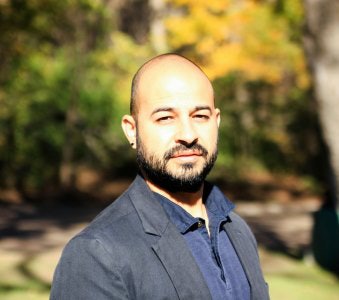 Dr. Robert Tinajero had considered a medical career before deciding to major in English and religion. (Photo courtesy of Robert Tinajero)
Dr. Robert Tinajero had considered a medical career before deciding to major in English and religion. (Photo courtesy of Robert Tinajero)With a mother as a university professor and former dean of the College of Education at the University of Texas at El Paso, there was little question that Dr. Robert Tinajero would go on to achieve greatness.
“It was a given we would go to college,” says Tinajero, who, like his three siblings, are all teachers. He’s an associate professor of English at Paul Quinn College — a small, private historically Black college located in Dallas. One sibling teaches elementary school, one middle school and the other teaches high school.
A Mexican American who was born and raised in El Paso, Tinajero enrolled in Austin College in Sherman, Texas, where he first flirted with the idea of becoming a doctor.
“Even though I loved science, it wasn’t my passion,” Tinajero says of his decision to abandon the pre-med route and major in English and religion instead.
By the time he enrolled at Southern Methodist University to pursue a master’s in theological studies, Tinajero was convinced that he wanted to follow in the footsteps of his mother and become a university professor. Initially, he toyed with the idea of teaching religion, but after earning an MFA in creative writing from the University of Houston and, later, a Ph.D. in rhetoric and writing studies from the University of Texas at El Paso, Tinajero made the shift to teaching English.
Even before he completed his dissertation, he landed a full-time teaching job at Tarrant County College — a two-year institution — in the Fort Worth, Texas area, where he eventually earned tenure in 2013.
After reading an article about the turnaround at Paul Quinn College (PQC) under the leadership of Dr. Michael J. Sorrell, Tinajero became intrigued. He sent Sorrell a tweet saying that he was interested in teaching at the college if a position became available.
Sorrell called him in. After a series of interviews, Tinajero was offered a full-time job at PQC, but he had to make a difficult decision. PQC does not offer its faculty tenure.
“It was definitely tough. I had to think about it for a while,” says Tinajero, who initially signed a two-year contract to join the then-struggling institution. “President Sorrell convinced me that it was a great place to be.”
More than two years into his professorship, Tinajero relishes the opportunities that he’s been afforded at the liberal arts college.
“What really drew me to the position was that I was placed in charge of developing the writing curriculum,” says Tinajero, who is the only full-time English professor at PQC but works with a handful of adjunct instructors.
When he is not teaching, he is supervising the campus writing center and assessing student writing. He is also spearheading new initiatives on campus such as the Race Relations Institute, which will launch in the coming months with the support of prominent Dallas preacher and PQC trustee, the Rev. Dr. Frederick D. Hayes III. The institute will provide a forum for students to grapple with racial issues.
“Our student body is becoming more diverse, so we want to make sure our student body is more educated about race and racism,” says Tinajero, whose dissertation focused on hip-hop.
Though he grew up in a middle-class home with both of his parents, Tinajero says that he feels a connection to his students — many of whom are the first in their families to attend college.
“These are the kinds of students I like working with,” he says. “To a certain extent, they remind me of myself and my friends. I have more of a connection to these students than students who come from more privileged backgrounds.”
Known across campus simply as “Dr. T,” Sorrell says that the young scholar has already made an impact on the campus.
“Dr. T is a vital part of the transformation of the academic experience at Paul Quinn College,” says Sorrell. “In his relatively short tenure with us, he has shown a willingness and ability to tackle tough issues such as race, writing ability and more. In the Quinnite Nation, there is no greater honor than to be told that you have left a place better than you found it. In the case of Dr. T, there is no question that he is living up to that standard.”


















